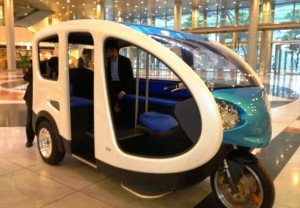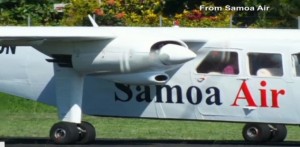“E-trikes” are part of a movement to cut CO2 emissions and fuel costs in Asian cities. Manila wants 100,000 by 2016.Tuk-tuks are a common way to get around in many Asian cities, but they contribute to urban pollution and high fuel costs.
Tokyo-based start-up Terra Motors wants to put more non-polluting vehicles on the streets with an electric tuk-tuk unveiled this week for the Philippines. The blue and white “e-tricycle” is powered by a lithium-ion battery and can carry six people including the driver. It’s just under 11 feet long and is steered with handlebars. It can travel some 31 miles per 2-hour charge, according to the firm, which is hoping to become the world’s top electric tuk-tuk maker.
“There is no single company in Asia that mass-produces electric bikes or tricycles,” president Toru Tokushige was quoted as saying by AFP. “I think it could have a big impact if a Japanese company is the pioneer in the market with products of such a futuristic design.”
The tuk-tuks will go on sale in fall 2013 for about $6,300 apiece. Terra Motors is gunning for a Philippine government plan, funded by a $300 million Asian Development Bank loan, to replace 100,000 gas-powered tricycle taxis with “e-trikes” by 2016.
The average tuk-tuk driver in the Philippines earns less than $10 a day, but e-trikes will save him $5 a day in fuel costs, according to the bank. The trikes will be introduced to Manila and other cities under a lease-to-own system. “Replacing 100,000 gasoline-powered trikes will enable the Philippine government to save more than $100 million a year in avoided fuel imports, while decreasing annual CO2 emissions by about 260,000 tons,” the bank said in a release.
I – Word Understanding
Emission – a substance (smoke) discharged to the air
Unveiled – revealed; shown to the public
mass-produce – to produce a large number
lease-to-own – a lease agreement with the option of buying
II – Have your say
1.Tuk-tuks, or auto rickshaws in English, are an essential form of urban transport in some developing countries, and a form of novelty transport in some Eastern countries.
2.Public transportation reduces the nation’s dependence on foreign oil. It saves gas, and reduces congestion, all while helping reduce our carbon footprint. In the US, more than 90 percent travel by automobile, and only 4 percent is by all forms of public transit.
3.Carpooling (also known as car-sharing, ride-sharing), is the sharing of car journeys so that more than one person travels in a car. It is highly encouraged for its environmental and economical benefits.



